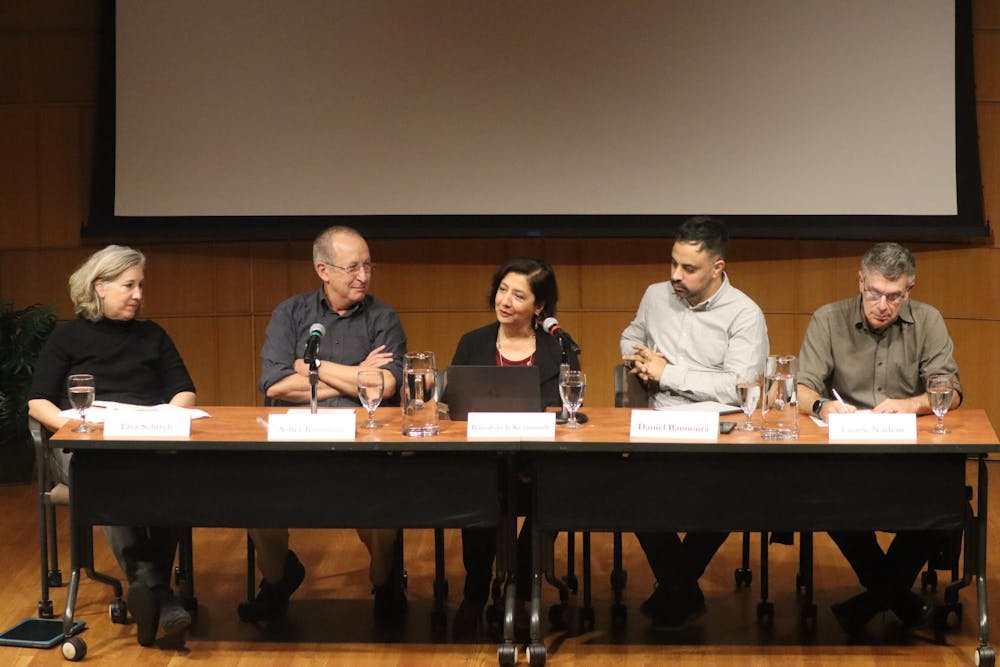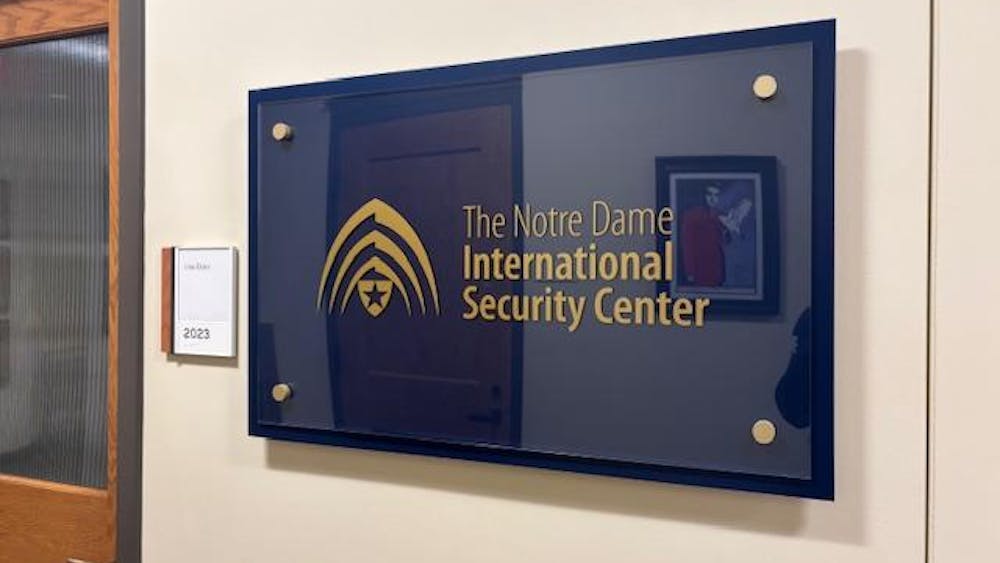Tuesday afternoon, a panel of academics met in the Hesburgh Center for International Studies auditorium to discuss the state of the Middle East one year after the Hamas terrorist attack on Oct. 7. Speakers included Daniel Bannoura, a PhD candidate in theology and a native Palestinian, Asher Kaufman, a professor of history and peace studies and a native of Israel, Banafsheh Keynoush, a visiting fellow at the Kroc Institute for International Peace Studies, Lisa Schirch, professor of the practice of peace studies, Atalia Omer, professor of religion, conflict and peace studies (who spoke via Zoom), and Laurie Nathan, professor of the practice of mediation, who narrated the talk.
The panel opened with Bannoura, who emphasized the importance of describing the situation in Gaza as a genocide and also discussed the history of “ethnic cleansing” purported by Israel against the Palestinian people.
Bannoura specifically discussed the current plight of Palestinians in the West Bank.
“For me, this is a very obvious case of continual dehumanization of the Palestinians. It did not begin on Oct. 8 or 7. This has been going on for 76 years,” he said.
Bannoura went on to argue that Israel is institutionally flawed and its philosophy of “Christian Zionism” is “racist.” Bannoura argued these governing ideologies make Israel un-democratic, and the United States and neighboring Western countries should not recognize Israel as democratic or normal.
Next to speak was Keynoush, an Iranian native, who spoke on the state of Iranian involvement in the Israeli-Palestinian conflict.
“Iranians are not as pro-Palestinian as the rest of the Middle East,” Keynoush said.
She went on to articulate the tension felt between many Iranian people and their governments, arguing Iranians are primarily concerned with preserving their own security and wealth.
“The government of Iran funds and arms a lot of groups across the Middle East, which is money taken from the average Iranians,” Keynoush said.
In terms of Iranian governmental action, Keynoush argued there is an Iranian desire for a potential peace agreement between several Middle Eastern countries, including nuclear proliferation agreements, despite the nation’s funding of terrorist groups, such as Hamas. Keynoush argued, however, that Israel is unlikely to sign on to any peace agreement.
Offering an alternate perspective was Kaufman, who highlighted the Israeli perspective within the Gaza conflict as it escalated from Oct. 7. In regards to the Hamas attack, Kaufman said, “Most Israeli Jews are still embedded in the trauma and shock of that day.”
Kaufman reaffirmed the primary motive of Israel in its domination of the Gaza Strip, which was to regain deterrence and seek retribution for the loss of Israeli civilians on Oct. 7.
“Israel has been attempting to regain deterrence by extreme and disproportionate response to the humiliating fate of that day,” Kaufman said.
At the conclusion of the panel, Schirch spoke on the role of United States policy initiatives in the Middle East following the Oct. 7 attack. Schirch outlined the diplomatic strategy of the Biden administration and the upcoming Trump administration.
“The Biden administration, like all the US administrations before, has pressed for a two-state solution,” Schirch said. She went on to discuss that although this seems to be a tactful initiative, Israeli Prime Minister Benjamin Netanyahu and the ruling coalition in Israel had abandoned hope for a two-state solution long ago.
In regards to the Trump administration, Schirch argued we are likely to see more intensified support for Israel’s military control of the Gaza Strip. Schirch anticipated that Mike Huckabee, Trump’s recently appointed US ambassador to Israel, will likely be a proponent of this. Huckabee will be unlikely to push for US humanitarian support for Palestine, and will continue to aid Israel in its objectives for the region, he said.
“I think that things are about to get much worse,” she said. “And I think that our social movement strategies in the United States have to get much smarter about what is actually possible, and how we can build coalitions here.”
Editor's note: A previous version of this story neglected to mention that Atalia Omer and Laurie Nathan also participated in the panel.










